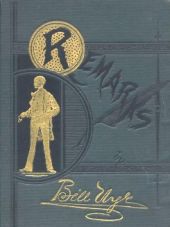Remarks
by Bill Nye

“There’s a big difference in doctors, I tell you,” said an old-timer to me the other day. “You think you know something about ’em, but you are still in the fluff and bloom, and kindergarten of life, Wait till you’ve been through what I have.”
“Where, for instance?” I asked him.
“Well, say nothing about anything else, just look at the doctors we had in the war. We had a doctor in our regiment that looked as if he knew so much that it made him unhappy. I found out afterward that he ran a kind of cow foundling asylum, in Utah before the war, and when he had to prescribe for a human being, it seemed to kind of rattle him.
“I fell off’n my horse early in the campaign and broke my leg, I rickolect, and he sot the bone. He thought that a bone should be sot similar to a hen. He made what he called a good splice, but the break was above the knee, and he got the cow idea into his head in a way that set the knee behind. That was bad.
“I told him one day that he was a blamed fool. He gave me a cigar and told me I must be a mind reader.
“For several weeks our colonel couldn’t eat anything, and seemed to feel kind of billious. He didn’t know what the trouble was till he went to the doctor. He looked at the colonel a few moments, examined his tongue, and told him right off that he had lost his cud.
“He bragged a good deal on his diagnosis. He said he’d like to see the disease he couldn’t diagnose with one hand tied behind him.
“He was always telling me how he had resuscitated a man they hung over at T–– City in the early day. He was hung by mistake, it seemed. It was a dark night and the Vigilance committee was in something of a hurry, having another party to hang over at Dirty Woman’s ranch that night, and so they erroneously hung a quiet young feller from Illinois, who had been sent west to cure a case of bronchitis. He was right in the middle of an explanation when the head vigilanter kicked the board from under him and broke his neck.
“All at once, some one said: ’My God, we have made a ridiculous blunder. Boys, we can’t be too careful about hanging total strangers. A few more such breaks as these, and people from the States will hesitate about coming here to make their homes. We have always claimed that this was a good country for bronchitis, but if we write to Illinois and tell this young feller’s parents the facts, we needn’t look for a very large hegira from Illinois next season. Doc., can’t you do anything for the young man?’
“Then this young physician stepped forward, he says, and put his knee on the back of the boy’s neck, give it a little push, at the same time pulled the head back with a snap that straightened the neck, and the young feller, who was in the middle of a large word, something like ’contumely,’ when the barrel tipped over, finished out the word and went right on with the explanation. The doctor said he lived a good many years, and was loved and esteemed by all who knew him.
“The doctor was always telling of his triumphs in surgery. He did save a good many lives, too, toward the close of the war. He did it in an odd way, too.
“He had about one year more to serve, and, with his doctoring on one side and the hostility of the enemy on the other, our regiment was wore down to about five hundred men. Everybody said we couldn’t stand it more than another year. One day, however, the doctor had just measured a man for a porus plaster, and had laid the stub of his cigar carefully down on the top of a red powder-keg, when there was a slight atmospheric disturbance, the smell of burnt clothes, and our regiment had to apply for a new surgeon.
“The wife of our late surgeon wrote to have her husband’s remains forwarded to her, but I told her that it would be very difficult to do so, owing to the nature of the accident. I said, however, that we had found an upper set of store teeth imbedded in a palmetto tree near by, and had buried them with military honors, erecting over the grave a large board, on which was inscribed the name and age of the deceased and this inscription:
“Not dead, but spontaneously distributed. Gone to meet his glorified throng of patients. Ta, ta, vain world.”
 Continue...
Continue...![[Buy at Amazon]](../images.amazon.com/images/P/B000875S1G.01.MZZZZZZZ.gif)